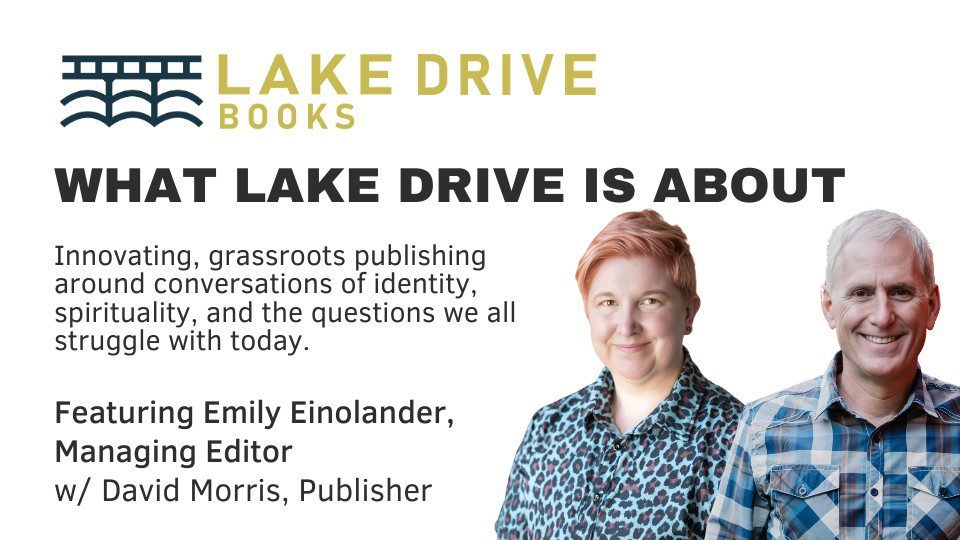A Discussion Featuring Lake Drive Books’ Managing Editor Emily Einolander, with Publisher David Morris
Lake Drive Books is not your typical publishing house. As a recent entry into a fast-evolving industry, it thrives on the mission to publish books that help you heal, grow, and discover. At its core is a deep commitment to storytelling that resonates with readers on multiple levels—emotionally, spiritually, and intellectually. Under the guidance of publisher David Morris and managing editor Emily Einolander, Lake Drive Books is shaping its niche by embracing a collaborative, inclusive approach to publishing.
In the video below, also on our YouTube channel, Morris (he/him) and Einolander (they/them) shared insights into the workings of the publishing world, the distinctive focus of Lake Drive Books, and the philosophy driving their editorial decisions. What emerges is a shared dedication to publishing as a tool for personal growth and societal transformation, with a strong emphasis on stories from the margins.
A Collaborative Approach
Emily Einolander, managing editor at Lake Drive Books, joined the conversation with a sense of humor and pragmatism about their role. Having worked in publishing for nearly a decade, Einolander brings a wealth of experience, ranging from bookselling and project management to ghostwriting and copywriting. Their journey began with a vocational master’s program at Portland State University, where they were introduced to the evolving nature of the publishing industry. The appeal of this constant evolution—marked by the rise of ebooks, audiobooks, and self-publishing—drew them into the field.
At Lake Drive Books, Einolander wears multiple hats. “Managing editor” might conjure images of a red pen-wielding editor sitting in an armchair, but as they describe, their role is much more dynamic. From scheduling and manuscript management to liaising with authors and coordinating with freelancers, Einolander ensures the smooth progression of each book from manuscript to publication. Working closely with authors, they help them refine their work while maintaining their unique voices and visions.
The collaborative nature of the publishing process is something Einolander deeply values. This close-knit collaboration, whether with seasoned writers or first-time authors, is a cornerstone of Lake Drive Books’ ethos. It’s not just about producing a book—it’s about creating a meaningful artifact that embodies the author’s knowledge, passion, and vision.
Publishing with Purpose
David Morris, the founder of Lake Drive Books, has been in the publishing industry for over 30 years. He has witnessed firsthand the rapid changes shaping the industry, particularly in the last two decades. While publishing may seem mysterious or intimidating to outsiders, Morris and Einolander demystify the process through their transparency and hands-on involvement with each project.
What sets Lake Drive Books apart from other publishing houses is its focus on spiritual and emotional authenticity. For Morris and Einolander, a book is a tool for transformation and liberation.
As Einolander explains, books are much more than content to be consumed; they are carefully crafted works meant to provoke thought and foster personal growth. This focus on depth is evident in the types of books Lake Drive publishes, which often explore spiritual, philosophical, and personal development themes. The books produced by Lake Drive are outward-focused, emphasizing shared human experiences.
A New Approach to Gatekeeping
One of the key topics that surfaced in the discussion was the concept of gatekeeping in the publishing industry. Traditionally, large publishing houses have acted as gatekeepers, deciding which stories get told and whose voices are heard. This model has historically excluded underrepresented groups, with the publishing workforce overwhelmingly made up of white, affluent individuals. Both Morris and Einolander are aware of the impact this has had on the types of books that reach the public.
However, they also see the democratization of publishing—through self-publishing and smaller independent presses like Lake Drive Books—as a positive change. These newer avenues for publishing allow for a broader range of voices and stories to be shared. Einolander, who also runs their own freelance business, Hybrid Pub Scout, specializes in assisting authors with self-publishing, helping them bring high-quality, professionally produced books to market without the traditional barriers posed by large publishing houses.
At Lake Drive Books, the focus is on helping authors find their audiences, no matter how niche or unconventional their subject matter may be. By shifting the focus away from rigid commercial metrics like New York Times bestseller status, the team emphasizes the importance of finding “your people”—the readers who will connect with and be transformed by the stories you tell.
Authenticity and Inclusivity
The values of inclusivity and authenticity are at the heart of Lake Drive Books’ mission. In their conversation, Morris and Einolander touch on the importance of creating spaces for people who exist in the “in-between”—those who may not fit neatly into categories, whether in terms of religion, identity, or ideology.
Books like Asian American Apostate by Scott Okamoto, for example, tell the story of a Japanese American who experiences racism at a leading evangelical college, delving into a nuanced, often underrepresented perspective. This approach aligns with the growing desire among readers for stories that ask questions, challenge traditional narratives, and explore complex identities. As Einolander notes, it’s difficult to market ambiguity, but it’s precisely this openness to exploring uncertainty and complexity that makes Lake Drive Books so vital in today’s publishing landscape.
In an industry that can often feel rigid and commercialized, Lake Drive Books stands out for its commitment to collaboration, inclusivity, and thoughtfulness. David Morris and Emily Einolander are driven by the belief that our books should be more than just content—they should be meaningful, transformative works that help readers heal, grow, and discover. Through their work, they are helping to create a space where diverse voices can be heard, and where stories from the margins can inspire and empower readers from all walks of life.


